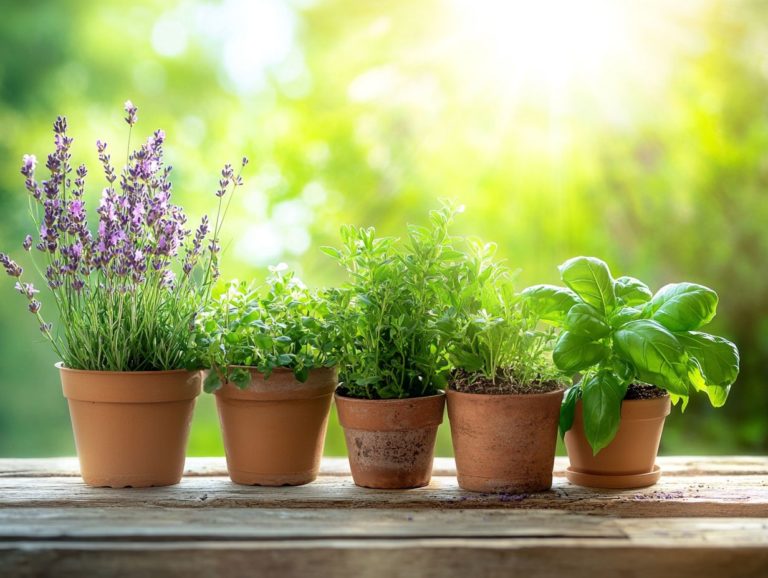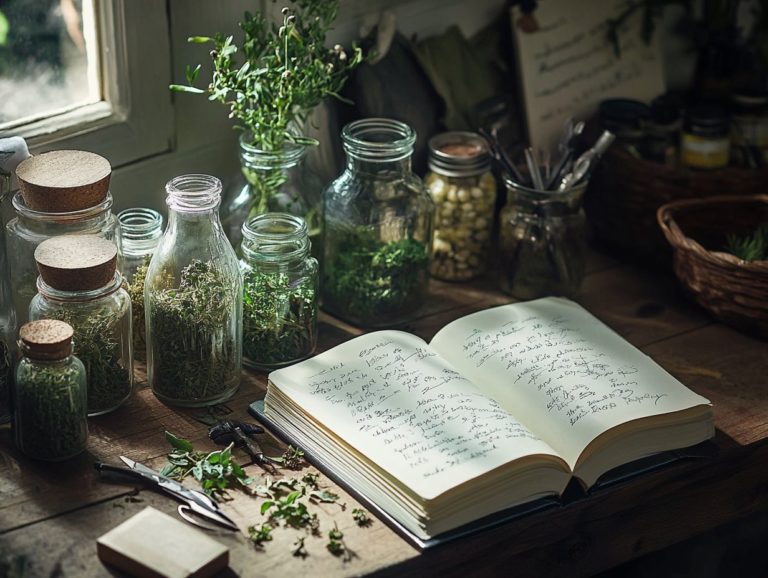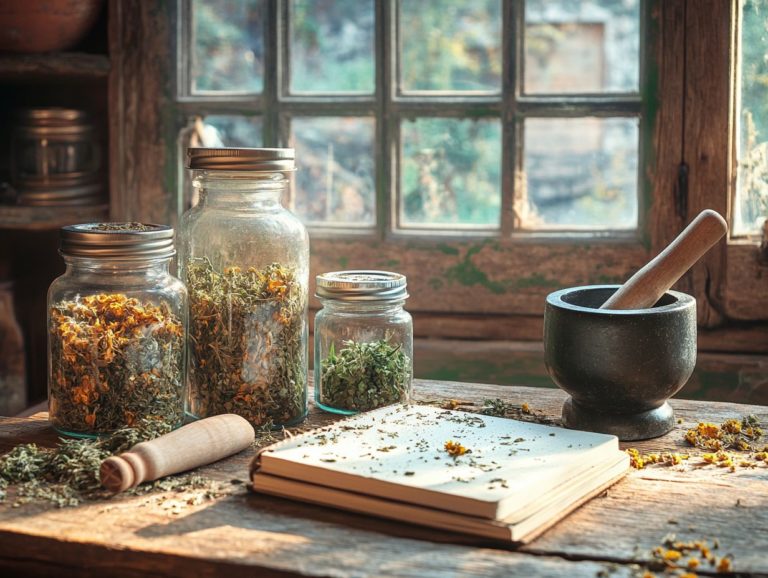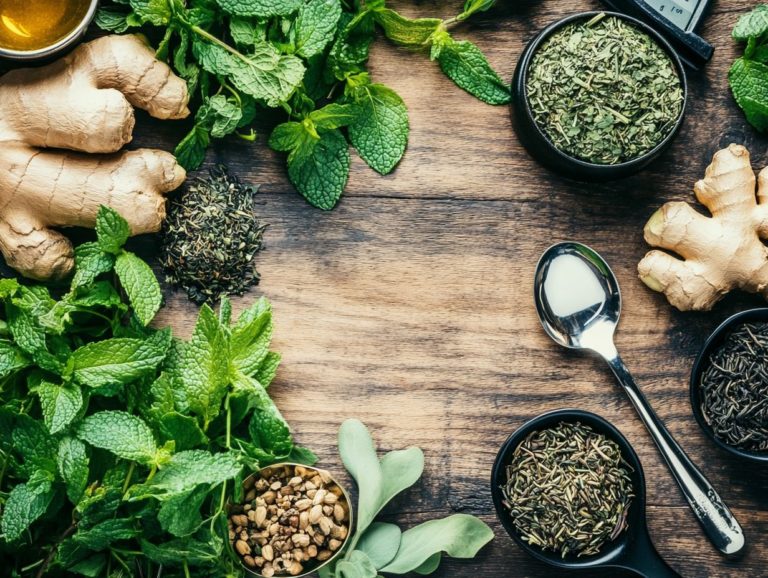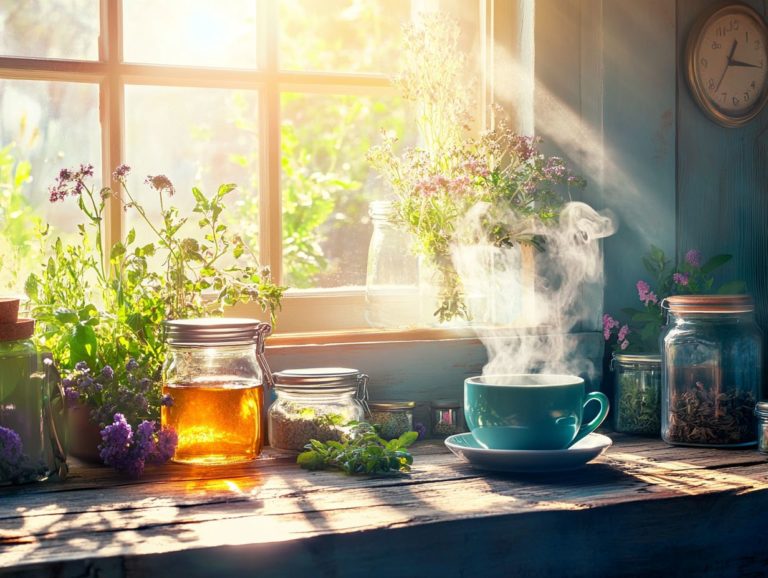Are There Herbal Solutions for Seasonal Affective Disorder?
Seasonal Affective Disorder (SAD) impacts many individuals, leading to feelings of sadness and lethargy as the seasons shift. If you’re exploring alternative methods to manage these symptoms, herbal remedies might be worth considering.
Get ready to dive into the world of SAD and discover how herbal remedies can make a difference! This article highlights various herbs that may offer relief, backed by research. It also covers how to combine these natural solutions with traditional treatments, outlines precautions, and suggests lifestyle changes to enhance your overall well-being, including the importance of light therapy and psychotherapy.
Whether you re curious about herbal options or seeking holistic strategies, this informative read is designed to provide valuable insights for everyone.
Contents
- Key Takeaways:
- Understanding Seasonal Affective Disorder (SAD)
- Common Herbal Remedies for SAD
- Effectiveness of Herbal Solutions for SAD
- Combining Herbal Solutions with Traditional Treatment
- Precautions and Side Effects of Herbal Solutions
- Other Natural Ways to Manage SAD
- Consulting with a Healthcare Professional
- Frequently Asked Questions
- Are there herbal solutions for Seasonal Affective Disorder?
- What are some common herbal solutions for Seasonal Affective Disorder?
- How does St. John’s Wort help with Seasonal Affective Disorder?
- Is Saffron effective in treating Seasonal Affective Disorder?
- Are herbal solutions safe for Seasonal Affective Disorder?
- Can herbal remedies be used with traditional treatments for Seasonal Affective Disorder?
Key Takeaways:
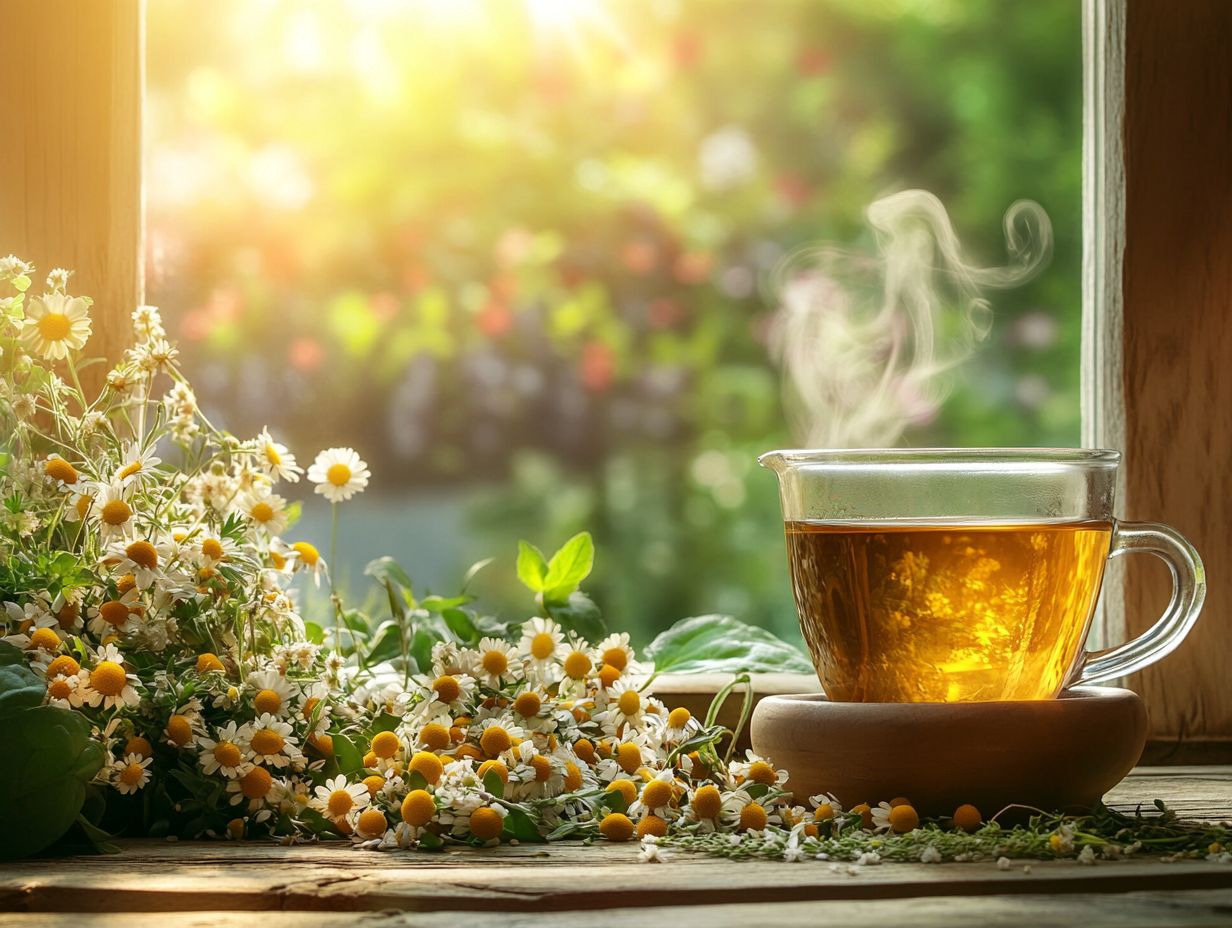
- Try herbal solutions to manage SAD effectively, but use them alongside traditional treatment methods.
- Explore common herbal remedies like St. John’s Wort, Ginseng, and Omega-3 fatty acids that can support mood and energy levels.
- Consult with a healthcare professional before adding herbal solutions to your treatment plan for SAD, as they may have potential risks and interactions with other medications.
Understanding Seasonal Affective Disorder (SAD)
Understanding Seasonal Affective Disorder (SAD) is essential for anyone who experiences this type of depression characterized by its seasonal pattern, especially during the fall and winter months when sunlight becomes scarce.
SAD can affect your mood, energy levels, and overall sense of well-being. Symptoms include fatigue, anxiety, and shifts in mood, which can be evaluated through diagnostic questionnaires by mental health professionals.
Seeking guidance from a mental health professional is vital for getting the right diagnosis and exploring treatment options like light therapy, medications, and cognitive behavioral therapy a type of therapy that helps change negative thought patterns. Approaches such as light therapy, psychotherapy, and medications can effectively help manage these symptoms and enhance your quality of life.
What is SAD and How Does it Affect People?
Seasonal Affective Disorder (SAD) tends to hit when the leaves start falling and the days get shorter, primarily during the fall and winter months.
This condition can show up in various ways, impacting how you feel, think, and function daily. Common symptoms include persistent sadness, fatigue, irritability, difficulty concentrating, and fluctuations in sleep and appetite patterns. For many, these feelings deepen during long stretches of reduced sunlight, leading to significant psychological effects like low self-esteem and a pervasive sense of hopelessness.
Recognizing these changes is essential; untreated SAD can worsen existing mental health challenges and disrupt your overall well-being, potentially leading to major depressive disorder. By understanding how this disorder manifests, healthcare providers can offer timely interventions, helping you regain control over your life.
Common Herbal Remedies for SAD
Common herbal remedies for Seasonal Affective Disorder (SAD) are increasingly sought as natural solutions to alleviate symptoms and enhance mental well-being, often alongside prescribed antidepressants.
These remedies not only help lift your spirits but also contribute to an overall improvement in health. Explore these herbal remedies today and take the first step toward feeling better!
Types of Herbs Used for SAD
Many herbs are known for their benefits against Seasonal Affective Disorder (SAD). They are rich in vitamin D and can enhance mood.
These natural remedies offer a holistic approach to alleviating symptoms associated with this type of depression, which often surfaces during the fall and winter months when sunlight is scarce. This emphasizes the importance of vitamin D intake.
For example, St. John’s Wort has been extensively studied for its antidepressant effects, serving as a natural alternative for mood enhancement. Herbs like Ashwagandha can balance stress levels and improve overall well-being, providing a calming effect that’s especially valuable during the darker seasons. Additionally, creating herbal remedies for seasonal changes can further support your health during these times.
Anecdotal evidence and clinical trials suggest that incorporating these herbs into your daily routine can lead to significant improvements in mood and energy levels, offering hope for those navigating the challenges of this condition. If you’re curious about their potential, you might wonder, can herbal remedies help with insomnia?
Effectiveness of Herbal Solutions for SAD
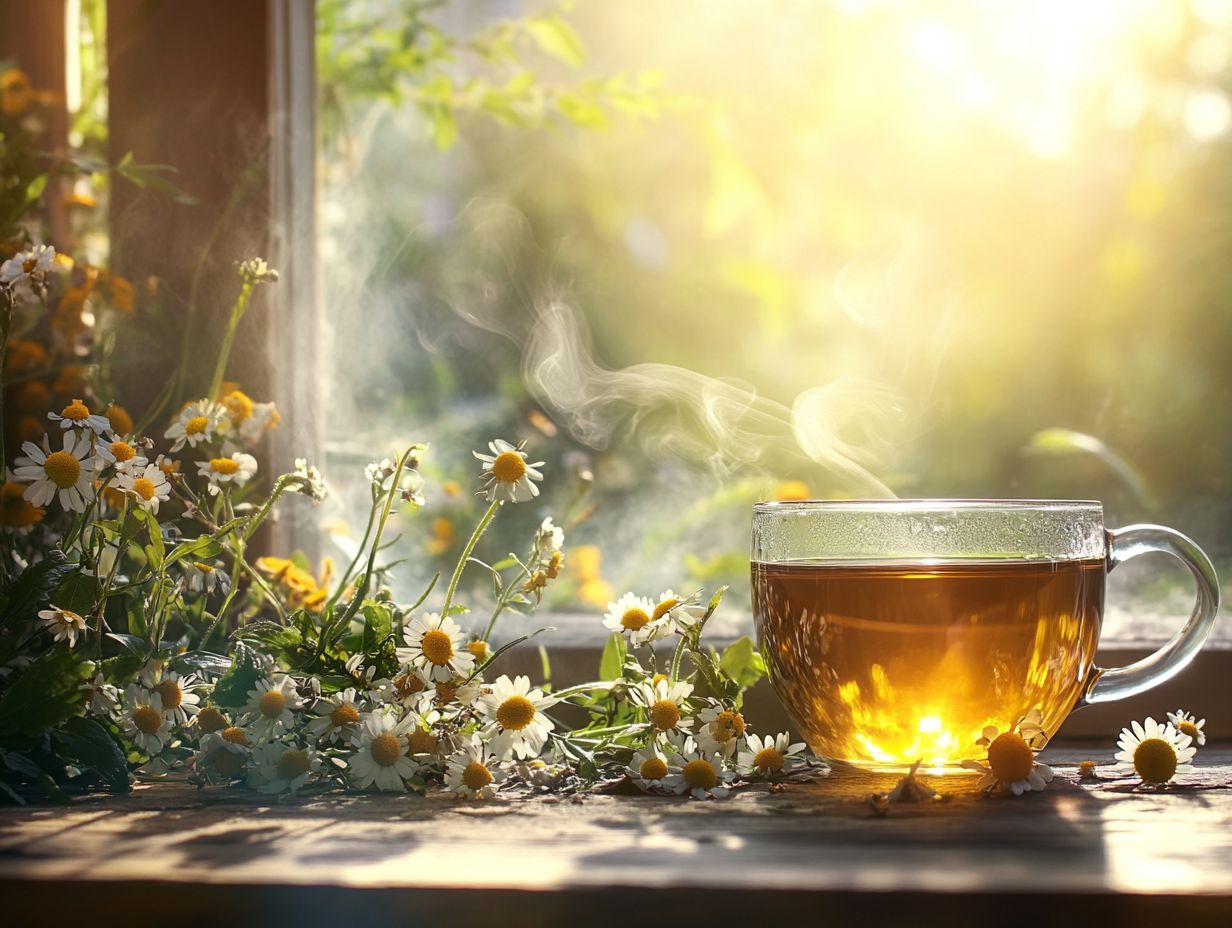
Discover how herbal solutions can transform your experience with Seasonal Affective Disorder (SAD)! Increasingly, studies are exploring how these remedies can provide symptom relief and bolster emotional well-being.
It s worthwhile to consider how nature s offerings might enhance your mental health during those dreary months.
Evidence and Studies on Herbal Remedies
Numerous studies have explored the evidence surrounding herbal remedies for SAD, highlighting their potential to enhance mental health and alleviate depressive symptoms, particularly focusing on omega-3 fatty acids.
One noteworthy study involved 200 participants and showcased the effectiveness of St. John’s Wort in reducing the severity of SAD symptoms. In this method, researchers ensured that neither the participants nor the researchers knew who received the treatment versus a placebo. This study raises questions about herbal remedies for mood enhancement and their potential benefits.
The results revealed significant improvements in mood and energy levels, suggesting that herbal interventions could complement traditional treatments. Another study involving 150 individuals found positive correlations between omega-3 intake and reduced depressive symptoms.
These findings underscore the need for further exploration into the integration of herbal remedies within mental health care strategies.
Combining Herbal Solutions with Traditional Treatment
Combining herbal solutions with traditional treatments for Seasonal Affective Disorder (SAD) can provide a holistic approach to managing your symptoms. Don’t wait consult your mental health professional today to unlock the full potential of herbal remedies!
How to Safely Incorporate Herbal Remedies
To safely weave herbal remedies into your treatment plan for Seasonal Affective Disorder (SAD), it s vital to follow the guidelines set by health care providers. This ensures you’re informed about dosage recommendations and potential interactions with existing medications, including antidepressants.
Before making any adjustments to your treatment, consult with a health care provider who can evaluate your individual health situation. If you’re considering herbal options, starting with small doses is wise; carefully monitor how they affect you and adjust based on your unique responses.
Regular check-ins with health care professionals can facilitate an open dialogue about the efficacy and safety of these remedies, providing reassurance and guidance throughout your journey.
Precautions and Side Effects of Herbal Solutions
Understanding the precautions and potential side effects of herbal solutions for Seasonal Affective Disorder (SAD) is essential. These remedies can interact with existing mental health conditions.
Potential Risks and Interactions
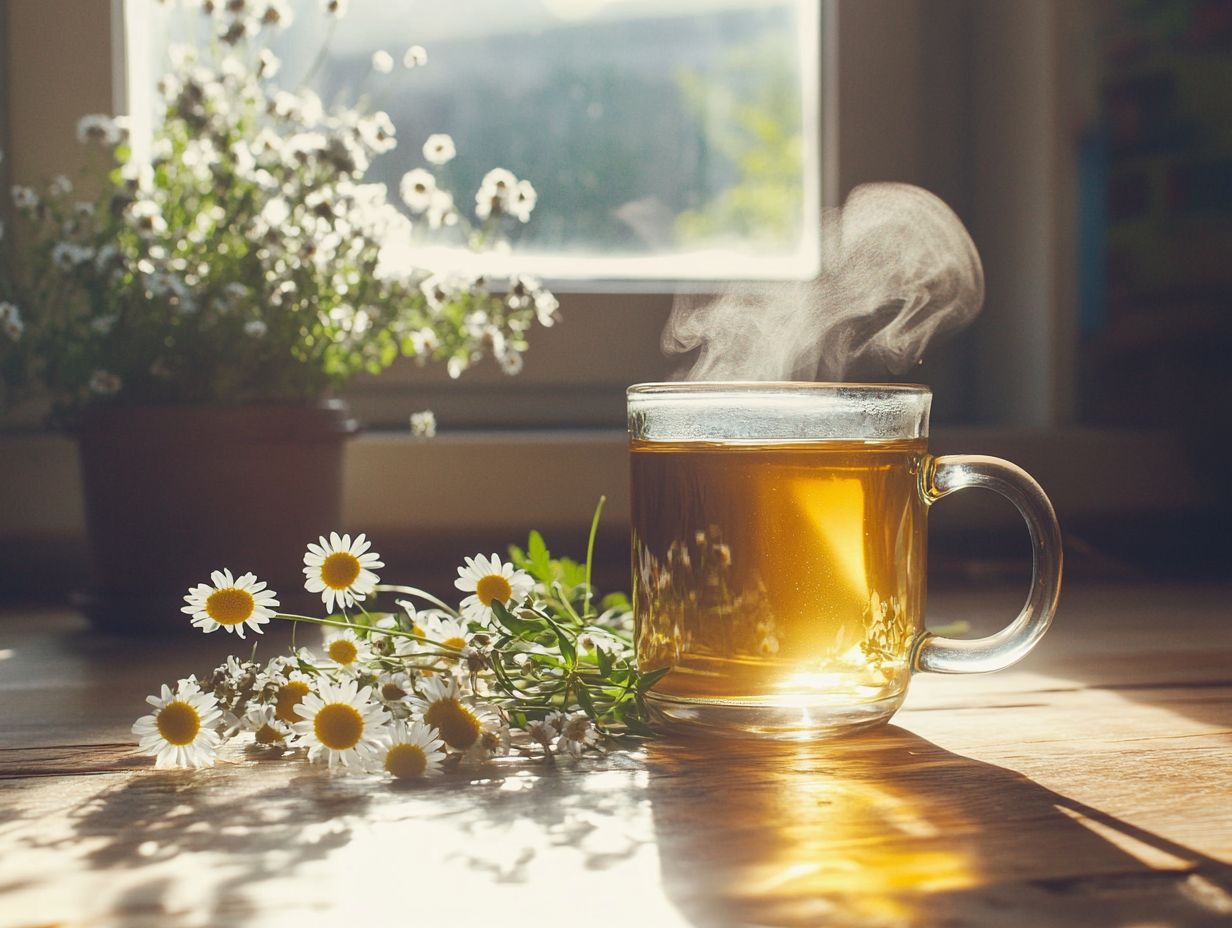
When considering herbal solutions for Seasonal Affective Disorder (SAD), stay alert to potential risks and interactions with other medications or treatments.
Many individuals turn to these natural alternatives in hopes of alleviating their symptoms. However, this can sometimes lead to unintended adverse effects, particularly when self-managing stress and treatments. For example, herbs like St. John’s Wort, often touted for mood enhancement, can significantly interfere with the effectiveness of various antidepressants. This interference may lead to increased side effects or a reduction in therapeutic benefits.
Mixing herbal remedies without professional guidance could complicate existing health conditions or undermine prescribed treatments. Therefore, consult with a qualified mental health professional before diving into these solutions. If you’re considering alternatives, you may wonder, are there herbal remedies for anxiety? This ensures a safe and effective approach to managing your SAD symptoms.
Other Natural Ways to Manage SAD
In addition to herbal remedies, you can explore various natural methods to effectively manage Seasonal Affective Disorder (SAD) through consistent exercise and nutrition.
Consider making lifestyle changes that elevate your nutrition, increase physical activity, and enhance your overall well-being.
Lifestyle Changes and Self-Care Practices
Adopting lifestyle changes and self-care practices is vital for managing Seasonal Affective Disorder (SAD) and enhancing your overall mental health. Incorporate regular physical activity and proper nutrition.
By adding regular exercise to your daily routine, you can significantly elevate your mood and energy levels, effectively counteracting the lethargy that often creeps in during the darker months. A balanced diet, rich in omega-3 fatty acids, vitamins, and minerals, can work wonders for your well-being, promoting both cognitive function and emotional stability.
Engaging in mindfulness practices, such as meditation and yoga, provides you with powerful tools to focus on being present, which can help reduce stress and alleviate anxiety symptoms. Ultimately, these holistic approaches assist in mitigating the effects of SAD and nurture a more resilient mindset that thrives throughout the seasons. Additionally, exploring whether herbal remedies can help with chronic fatigue may offer further support in managing your well-being.
Consulting with a Healthcare Professional
Consulting with a healthcare professional is essential for anyone dealing with Seasonal Affective Disorder (SAD). This step ensures you receive the appropriate treatment and evaluation tailored specifically to your unique needs.
Your well-being deserves this thoughtful attention.
When to Seek Professional Help
Knowing when to seek professional help for Seasonal Affective Disorder (SAD) is crucial for ensuring timely intervention and effective management of symptoms.
Recognizing the signs early can significantly impact your overall well-being. If you find yourself grappling with persistent feelings of sadness, a noticeable lack of energy, difficulties concentrating, changes in your sleep patterns, or an unexpected craving for carbohydrates, these may serve as important warning signals.
Withdrawing from social activities or losing interest in things you once enjoyed are key indicators that it s time to have a conversation with a healthcare provider. Seeking professional guidance not only aids in managing the condition but also ensures a tailored approach to recovery, ultimately enhancing your quality of life.
Frequently Asked Questions
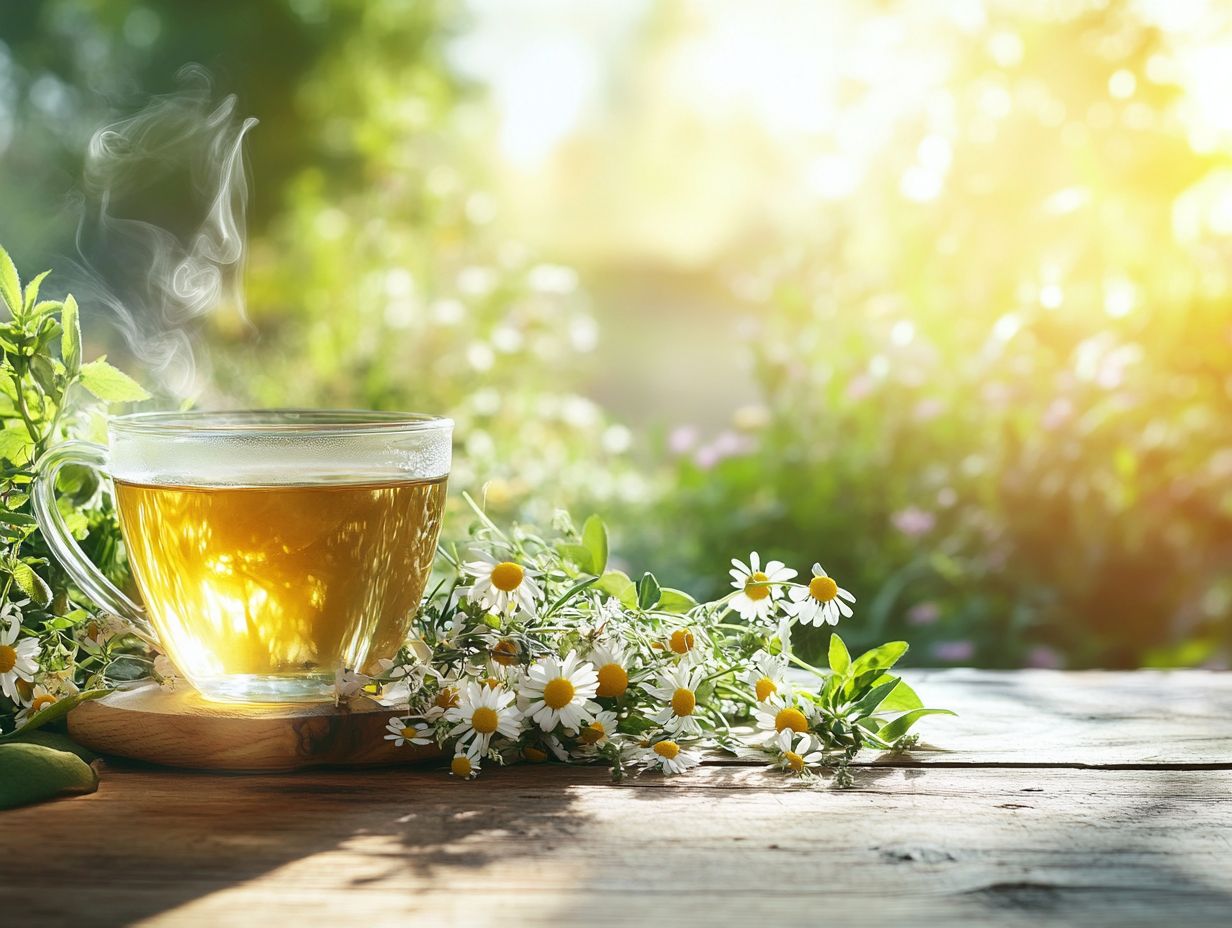
Are there herbal solutions for Seasonal Affective Disorder?
Yes, several herbal remedies have been found effective in managing symptoms of Seasonal Affective Disorder (SAD).
What are some common herbal solutions for Seasonal Affective Disorder?
Some common herbal solutions for SAD include St. John’s Wort, Saffron, and Rhodiola Rosea.
How does St. John’s Wort help with Seasonal Affective Disorder?
St. John’s Wort has been found to increase levels of serotonin and dopamine in the brain, which can improve mood and alleviate symptoms of SAD.
Is Saffron effective in treating Seasonal Affective Disorder?
Yes! Studies suggest that saffron can be just as effective as traditional antidepressants for symptoms of SAD.
Are herbal solutions safe for Seasonal Affective Disorder?
Herbal solutions are generally safe. Still, consult a healthcare professional before starting any remedy, as some may interact with other medications.
Can herbal remedies be used with traditional treatments for Seasonal Affective Disorder?
Absolutely! Many people find that combining herbal remedies with therapies, like light therapy, can improve SAD management.

